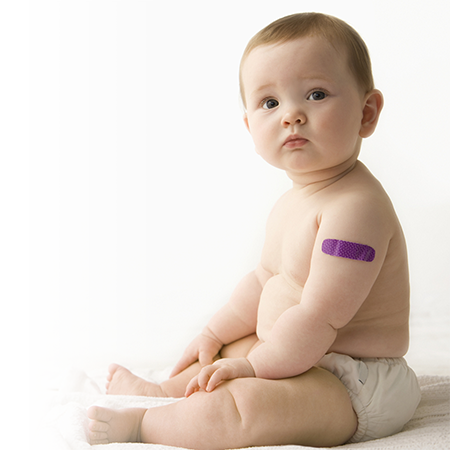Are you familiar with whooping cough? It's a disease that can sometimes have serious consequences, but that can be prevented by vaccination.
What is whooping cough?
Whooping cough (pertussis) is an infection caused by a bacteria called Bordetella pertussis and that attacks the respiratory tract. It can occur at any age, and individuals who are not vaccinated against the disease are more at risk of catching it.
Whooping cough is very contagious. It is transmitted by the droplets projected in the air by an infected person who coughs or sneezes. The onset of symptoms usually occurs 7 to 10 days after the person has contracted the infection. The disease can last for a very long time, between 6 and 10 weeks, and sometimes longer.
Individuals affected by whooping cough, who do not get treatment, will be contagious for up to three weeks after having begun to cough. If they are treated, they will be contagious for up to five days after having begun treatment.
What are the symptoms of whooping cough?
The first symptoms of the disease resemble those of a cold:
- fever
- coughing
- runny nose, and
- watery eyes
Subsequently, coughing intensifies and can lead to violent bouts of coughing, to the point where it can cause vomiting and respiratory problems. This bout of coughing is followed by a whooping sound during inhalation, giving the condition its name "whooping cough". Coughing is more significant during the first 2 to 3 weeks, then gradually diminishes. However, it sometimes lasts for several weeks and even several months.
If you think your child or another family member suffers from whooping cough, it is important to see a doctor to obtain an accurate diagnosis and the right treatment. In Quebec, whooping cough is a "notifiable disease". This means that public health authorities must be notified when a case of whooping cough is diagnosed.
How is whooping cough treated?
Fortunately, there are treatments available against whooping cough. Because the disease is caused by bacteria, an antibiotic treatment will be prescribed if the disease is detected early. Antibiotics contribute to reducing the spread of the disease, and in some cases, reducing symptoms.
Other measures can also be taken to promote the affected individuals' comfort. Here are some examples:
- ensure that they drink plenty of liquids
- encourage them to rest
- use acetaminophen or ibuprofen to ease pain and fever
- avoid aspirin (acetylsalicylic acid) or any product that contains it for children and adolescents
Your pharmacist can inform you about symptom relief. If you must purchase a product offered at the pharmacy, he/she will give you the instructions for use. If your doctor prescribes medication, your pharmacist will check if it is the best treatment and will provide you with information.
What are the complications of whooping cough?
Vigilance is crucial, since whooping cough can cause serious complications. For instance, it can lead to:
- significant respiratory problems
- convulsions
- problems to the brain, and
- coma
Those most at risk of developing complications from whooping cough are young children, particularly babies under the age of one. If you suspect that your child is affected by whooping cough, you must see a doctor as soon as possible.
How can whooping cough be prevented?
Fortunately, there is an effective way to prevent whooping cough: vaccination. A vaccine against whooping cough is available in Quebec and is provided free of charge as part of the universal immunization program. It is part of the components in certain combination vaccines; in other words, vaccines that offer protection against several diseases at once. It is crucial to follow the recommended immunization schedule to obtain optimal protection.
If your child is exposed to someone who has whooping cough and if his/her vaccines are not up-to-date, he/she should be vaccinated as soon as possible. In some cases, is may be necessary to prescribe antibiotics. Therefore, you must see a doctor.
Another way to prevent whooping cough is to avoid all contact with a person affected by the disease while he/she is contagious.
Today, whooping cough can easily be prevented owing to vaccination. However, if you are ever faced with this disease, you are now able to recognize it and deal with it.
Speak to your pharmacist for additional information about whooping cough or vaccines.

